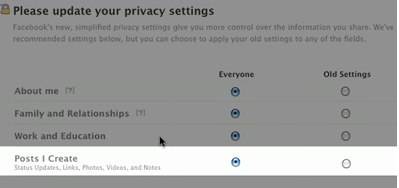Facebook announced this morning that its 350 million users will be prompted to make their status messages and shared content publicly visible to the world at large and search engines. It’s a move we expected but the language used in the announcement is near Orwellian. The company says the move is all about helping users protect their privacy and connect with other people, but the new default option is to change from “old settings” to becoming visible to “everyone.”

This is not what Facebook users signed up for. It’s not about privacy at all, it’s about increasing traffic and the visibility of activity on the site.
Update: See also our in-depth interview with Barry Schnitt, Director of Corporate Communications and Public Policy at Facebook, about why these changes were made.
Information like your email address is recommended to remain limited to friends, but make no mistake about it – Facebook wants you to make the status messages you post visible to the entire internet.

According to the video explaining the changes, the new default for status messages is “everyone.” That’s a huge change. Of course it’s not hard for people to keep their existing privacy settings, but confusion around what those settings are is hardly resolved by the phrase “old settings” and a tool-tip phrase appearing when you hover over that option.
Update:Some users are saying that their default options are in fact on “old settings” and not “everyone.” We’re hearing that “old settings” as private is the default for users who have ever changed their privacy settings and set them to private. People who have not changed their settings ever or who have set them to public already, will be defaulted to public. That’s what we think, it’s hard to know for sure. Facebook is maddeningly unclear about what exactly is going on. Part of the problem is that they are willing to tell press that they want to move users toward being more public, but when communicating with its users they appear to put more emphasis on communicating about privacy than is warranted by the changes at issue.
the Facebook blog post about the announcement. Previous moves by the company, like the introduction of the news feed, have seen user resistance as well – but this move cuts against the fundamental proposition of Facebook: that your status updates are only visible to those you opt-in to exposing them to. You’ll now have to opt-out of being public and opt-in to communicating only with people you’ve given permission to see your content.
Will users go for it? If Facebook becomes a lot more like Twitter, will users stick around? The network of friends you’ve created on Facebook can’t be taken anywhere else – access to those people off-site is limited due to “privacy concerns.”
This is an amazing move that was announced with limited press attention. A Facebook group message to press was sent out at 6am, two hours before a press phone call. The announcement is a long, wordy and unclear text putting undue emphasis on Privacy when the new options clearly favor going public. Earlier this week the company made an announcement about forthcoming privacy policy changes and Open was not the recommended setting.
Facebook spokesman Barry Schnitt told Reuters today that Facebook was recommending that posts be viewable to everyone because such sharing of information is consistent with “the way the world is moving.” But as the largest social network in the world, isn’t it Facebook that effects these kinds of changes?
Facebook confirmed to us in a press call earlier this year that the company does in fact want users to post more publicly and we expected a site-wide call for users to loosen privacy restrictions – but not like this. This announcement was couched in language of user control and privacy.
A much more honest approach to privacy would be to encourage users to create lists of contacts and encourage them to select which list any update was visible to. Instead, that’s greatly underemphasized.
Expect to see this story blow up for the rest of the year. It’s a very big move.
See our previous coverage for context:
Facebook Wants You To Be Less Private – But Why?
A Closer Look at Facebook’s New Privacy Options
Is Facebook a Cult?





















